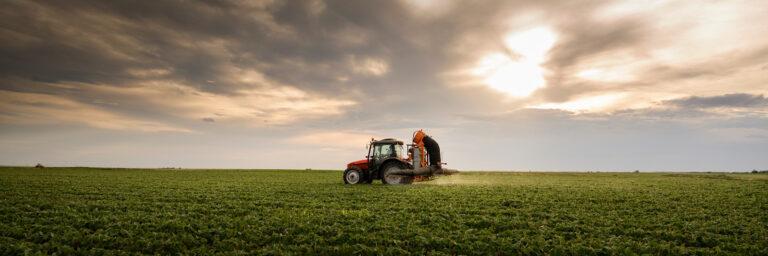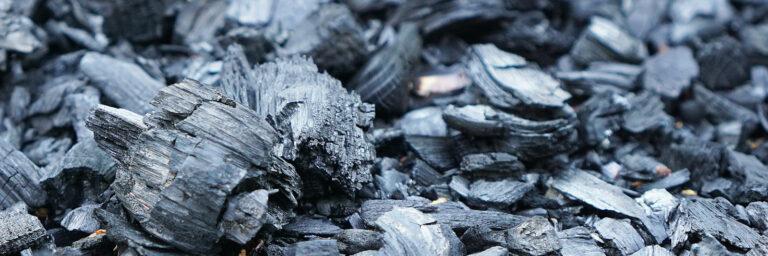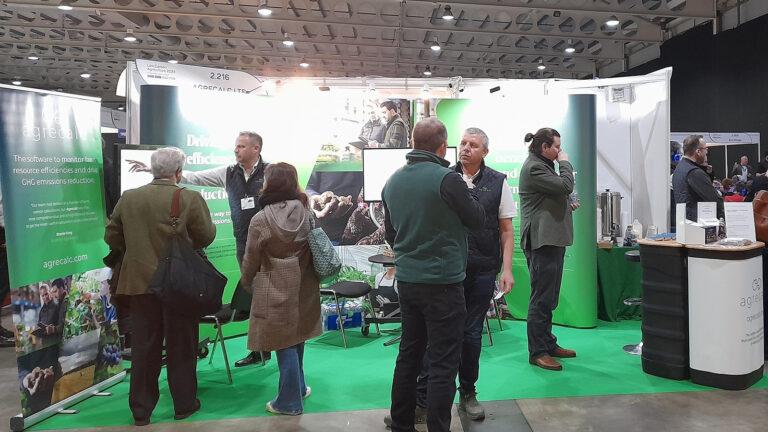
April Business Update: SRUC
After two years of operation as a Limited Company, Agrecalc became part of Scotland’s Rural College (SRUC) as of 1 April 2025.
As agricultural consultants doing carbon assessments, your role is to inform the client on why a carbon assessment is important to them, how it can help their business, explain how the process works and what they will get out of it.
Advisors bring the knowledge to help the farmer understand what data is required, and they’re bringing the platform knowledge from using it in their day-to-day job.
We have interviewed three consultants who use Agrecalc in their day-to-day work, and here are the insights and lessons they shared with us.
“I quite often think of this as a different lens through which you can look at your business performance”, says Mhairi Dalgliesh, consultant for SAC Consulting. “A lot of the time farmers look at financial performance, working with accountants to measure it from the money side. With carbon assessments you’re coming at it from the carbon and emissions side. As the mitigations, suggestions and recommendations that are pulled out of a carbon audit link back to productivity and efficiency, this can result in higher profitability or cost saving”.
Ian Thompson, Associate Director with Laurence Gould Consultancy, agrees: “Agrecalc identifies a number of key metrics. Understanding your businesses’ emissions is similar to understanding its financial performance. Relying on just one metric, e.g. the profit and loss, does not give a complete picture of the business financial health. Agrecalc tells you your total emissions, your emissions per hectare for each enterprise, your emissions per kilo of output, indicates what is likely to be happening with soil carbon and sequestration, and benchmarks your results against others.”
“One of the main tasks when informing the farmer is being upfront about the challenges of getting the data and the quality of information”, says Ian. “Gathering information effectively and accurately, recognising materiality of that information is almost as important as analysing the output and putting the results in context.”
Breaking the data requirements down into a format that is manageable for the farmer is paramount. The platform will look confusing for someone who does not use it regularly, cautions Mhairi; not knowing which information is needed for which field leads to, for example, missed deadlines. That is where your consultant comes in by knowing to ask relevant questions, e.g., how many cows calved based on how many went to the bull.
Mhairi explains: “A consultant breaks down the process into a step-by-step format to allow the farmers to provide the data. And it also works the other way around: collating data into the format needed by the platform, so that the assessments come back to the farmers with the highest accuracy possible.”
With loads of buzzwords around carbon emissions floating about, there is a struggle for farmers to visualise what relevance this has for their business. All consultants agree that it is vital that farmers see past the compliance, regulation and requirements tick box exercises, and understand the physical performance benchmarks that exist as a part of the carbon assessment.
Comparing those benchmarks in a carbon assessment allows for the strategy to be developed. “By understanding how the business performs, a strategy for managing carbon emissions can be set”, says Ian. “This will be different for each business and based on their world view, commercial relationships, and characteristics of the farming and diversified business. We can establish emissions goals, and draw plans, which can then be measured against the strategic goals of the business. Ultimately this will impact on the business’ long term financial health.”

“Without Agrecalc estimating carbon emissions would be almost impossible, we can now deliver accurate and useful carbon audits in a time efficient manner […] Agrecalc are a friendly bunch and always want to help in making our life easier. We understand that carbon is a complex issue and that all calculators have had to work hard to deliver a robust product to the market. We can see a continuous development in Agrecalc’s approach and delivery in terms of the software, its use, but most importantly the value it delivers.”
Ian Thomson, Associate Director, Laurence Gould Partnership
“We’re starting to see a significant increase in carbon assessment in the last two years in Scotland, mainly due to the funding schemes available, particularly with the PSF (Preparing for Sustainable Farming), which also opened the doors to soil sampling funding”, continues Mhairi.
“Going forward, carbon assessments are going to be linked to subsidy payments and there’s an option to qualify for a subsidy payment in 2025, if you’ve completed a carbon assessment.”
Getting some farmers to commit also presents a challenge, as at the moment, finding ways to draw value from reducing emissions on farm is meeting headwinds from a mindset of ‘things have always been done a certain way’.
“When a farmer works with an advisor on a carbon assessment, they get recommendations from a consultant who understands how the figures in the report came to be, and then interpret and personalise them, in order to improve the farmer’s carbon footprint. Most often this will improve productivity, and that goes hand in hand with profitability, or at least, with efficiency and income”, says Mhairi.
A very important aspect of incorporating a carbon assessment into an overall business strategy is preparing for change. “The carbon space is still developing. Whether in the [near] future we have carbon tax, can sell offsets or gain premia form low carbon produce, by understanding its carbon picture, any business is better placed to make better decisions irrespective of how the carbon space develops”, says Ian.
“We chose Agrecalc over other calculators for four reasons: we felt that Agrecalc had and still does have the best understanding of livestock businesses, the report gives us all the metrics we need, emissions are estimated at enterprise level, and it was the only calculator that had a comprehensive benchmarking system”, continues Ian.
“As we move forward it has become clear that the underlying assumptions associated with, say the embedded emissions in 1 tonne of fertiliser, will change as the science and our understanding of the impacts of its use improve. Agrecalc Cloud was designed so these ‘emissions factors’ change all audits, both historic and current – [they] update automatically so you are always comparing like with like, which is a crucial factor in monitoring progress towards the business goals.”
The new platform seems to be eliciting positive feedback form users.
“Agrecalc Cloud has a sleek and clear layout, and navigation-wise, it is quite easy, as there are different ways in which you can navigate”, says Mhairi. “It’s clear which pages you’ve been on, and which ones you haven’t been to yet. It is also good that the system has the same layout regardless of how many or what enterprises you have. So even if you know that you’ve not got arable crops, so the pesticides page doesn’t apply, it is still in the same place – you’re going to get used to the system quite quickly.
“There is also a very thorough set of guidance notes that you can go back to whenever you need to clarify something. The team is also quite responsive to ideas on how to develop the platform further”, says Mhairi.
“I’ve recently started using the Agrecalc Cloud platform, and a lot of the challenges we were facing with the previous version have been dealt with on the new platform. The one that was always hard and would drain your head, was how to handle manures. It felt like it was just a bolt-on to the soil carbon module, and wasn’t quite as clearly laid out. Whereas now on the Cloud platform, we’ve got distinctly imported manures and the transferred manures pages.”
Among the most common suggestions form the consultants is the integration with other systems that would help with the manual part of administration. Being time-poor is a common challenge with both farmers and consultants – the former taking long to pull the data together (e.g. purchases, sales, deaths from books or old invoices), the latter struggling to finish a carbon assessment before deadline.
This is especially true in a season with changing weather patterns. However, John Ker, the farmer who was part of the PRISM project says: “Having access to the Agrecalc calculator was a good reminder of the importance of finding time in our busy lives to sit down and have a think; to have a look at the inputs and how much everything is really costing. It gave me the incentive to stop and critique our system and review it where needed. It’s certainly something I would consider having done again, so I can compare these results with another set in the future.”
The important final step in all carbon assessments is sending it for a Validation.
“The validation team are there to work with you, they are fellow consultants”, says Sarah Kerr, an experienced validator with SAC Consulting. “It shouldn’t be seen as an assessment, whether you’re a part of the same company or in two different ones. You shouldn’t get yourself in a flap – ‘oh, I did things wrong’. We’re coming at it with fresh eyes and no bias, just based on the data that we see in front of us and our own extensive experience with the platform.”
With all that said, it seems that consultants agree that incorporating carbon assessments into farm business strategies is not only about meeting regulatory requirements but also about driving long-term efficiency, productivity, and profitability. With Agrecalc’s powerful platform, consultants are well-equipped to guide farmers through the process, helping them make informed decisions that benefit both their operations and the environment.

After two years of operation as a Limited Company, Agrecalc became part of Scotland’s Rural College (SRUC) as of 1 April 2025.

Biochar is a carbon-rich material produced by pyrolysing biomass, which offers a variety of potential agronomic benefits. In this guest article, Black Bull Biochar discusses how these effects work together to bolster productivity, sustainability, and resilience in farming.

The Agrecalc team is looking forward to welcoming you at our stand (2.844) at this year’s Low Carbon Agriculture Show, taking place on March 5 and 6, at NAEC Stoneleigh near Kenilworth.